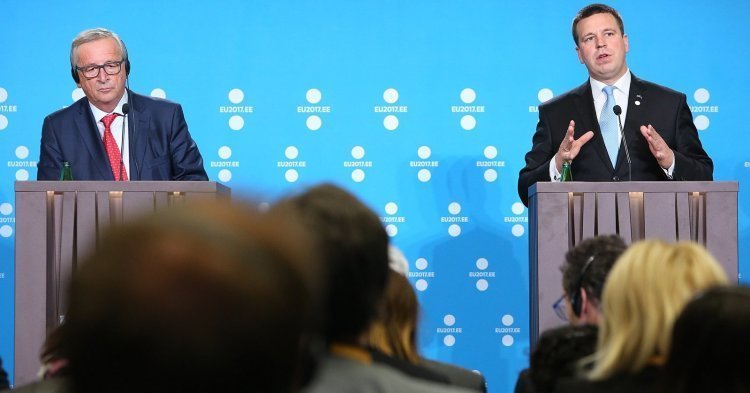While Emmanuel Macron’s speech at Sorbonne had been barely digested, the EU Heads of States and governments met in the beautiful city of Tallinn, the capital of Estonia, attempting to bring out a roadmap in the areas of digital economy, transparency and security. These are themes that Estonia considers priorities for its presidency of the Council, as the country is performing a digital transition in its administration and economy, having suffered from a significant previously unseen cyberattack in 2007, probably directed by the Kremlin.
“Some feared the theme of digital technology would be pushed aside.”
In the beginning of the week, some feared that this theme dear to Estonia would be eclipsed by the weak improvements in the Brexit negotiations and by the tensions between Madrid and Barcelona regarding the Catalan independence referendum organised on the 1st of October. Moreover, an informal dinner was organised on the 28th of September, during which the French President again introduced his project of European reforms, a project received favourably by his counterparts, despite various reservations. In this context, one could indeed fear the theme of digital technology could be set aside.
Fortunately, it didn’t happen, and at the end of the summit, Emmanuel Macron presented his proposals in the sector of digital technology after the common press conference of Donald Tusk, Estonian Prime Minister Jüri Ratas, and Jean-Claude Juncker. An ambitious roadmap, responding to the main challenges posed by its unrestrained and sometimes chaotic development, which must however be fully implemented to make a real difference. Thus, in concert with the Estonian President Kersti Kaljulaid and Jüri Ratas, the French President mentioned four subjects: the digital single market, transparency, the fight against digital divide, and cybersecurity.
A roadmap responding to the challenges posed by digital technology
The economic and security aspect of the “European digital project” should get the most support among the 28 Member States of the Union. The digital and innovative dimension of European economy has been present for more than 15 years, especially with the 2000 Lisbon Strategy, or more recently the “digital single market” proposal of May 2015. As the European Union is falling behind in this sector, compared to the United States, the single market’s completion, especially via the harmonisation of legislation, must allow for a considerable correction of this.
In recent years, cybersecurity has also emerged as a necessity given the interferences in electoral processes, especially in the United States and in France. Measures for the security of private and sensitive data must absolutely be decided on at the European level, for them to be truly effective when faced with hackers who are often in the service of states like Russia or North Korea. Flaws of IT security systems are regularly exposed, and Estonia is not spared, despite its lead in this area.
The transparency of digital platforms risks presenting more difficulties. Indeed, the pressures of big internet enterprises will certainly be very important, especially concerning the “GAFA tax” (acronym formed by the main firms’ names: Google, Amazon, Facebook, Apple). This project is advanced by Emmanuel Macron and Bruno Le Maire (the French Minister of Economy and Finance) to tax, in a given country, the turnover instead of the whole profit, more easily transferable to a European country applying a very beneficial tax rate. On this question, Ireland and Luxembourg threaten to block any proposal leading towards more fiscal harmonisation, despite 19 EU countries rallying for the French proposal.
The meeting of the European ministers in charge of telecommunications, brought forward to October, will be the occasion to make progress on concrete proposals in the subjects addressed during this digital summit, the first in history and the culmination of the Estonian presidency, especially on the taxation of web giants. Digital technology, given its economic, political and social implications, must imperatively find a central position in European law, and especially in the project of “European rebuilding” of President Macron, who introduces himself as the champion of a progressive Europe. He should not relent in his efforts to make concrete and ambitious proposals.“”



Follow the comments: |
|
